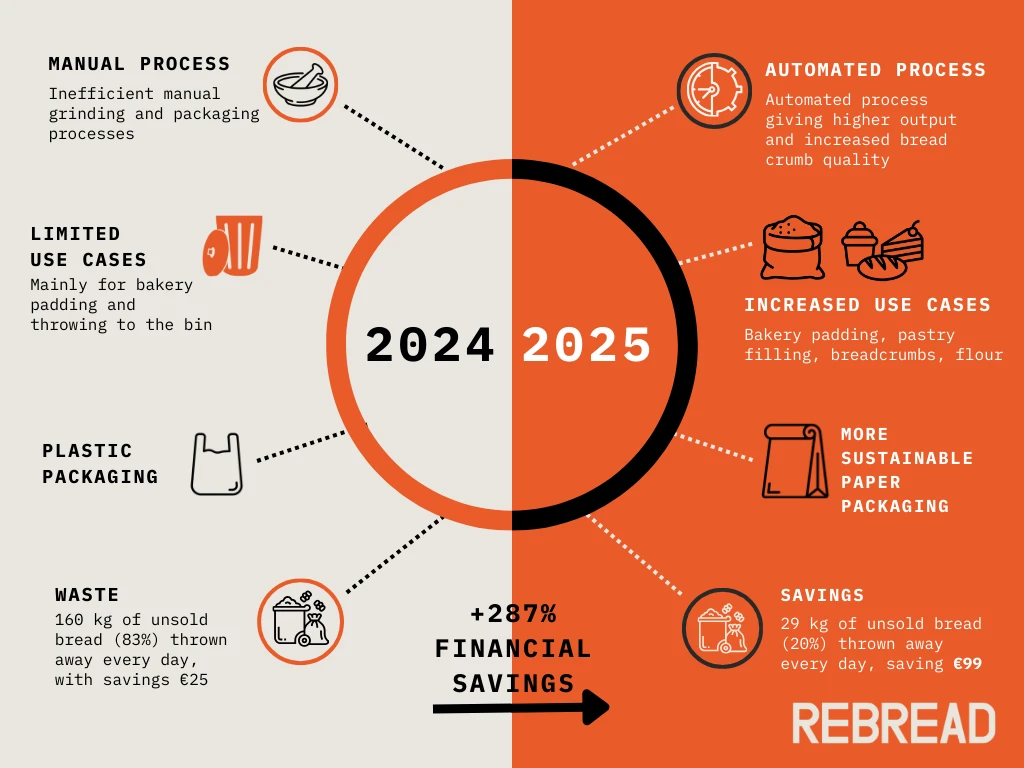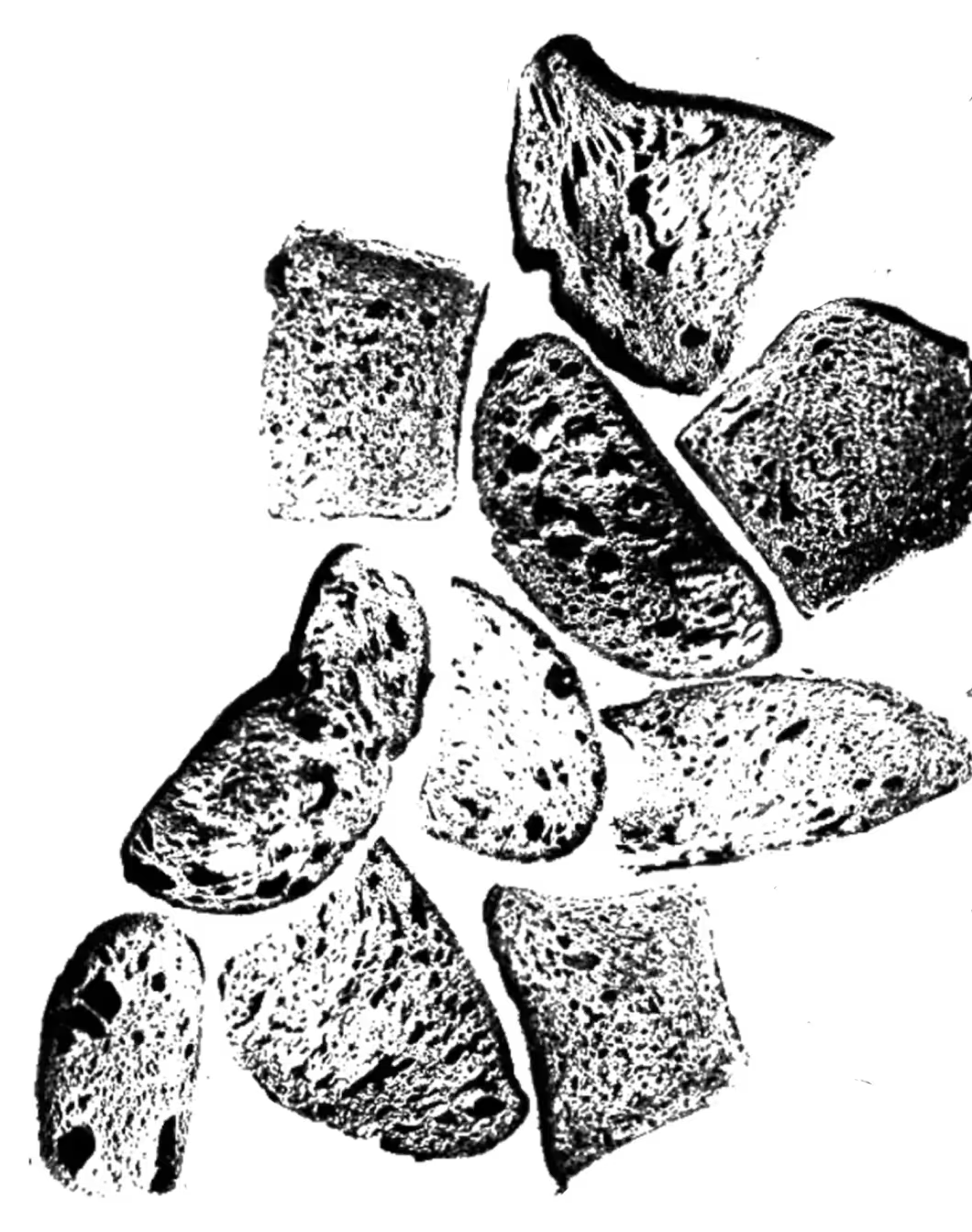

The Save the Bread: Upscaling the Bread Waste into Baking Super-Flour initiative is a project implemented by the United Nations Development Programme (UNDP) under the Polish Challenge Fund with the financial support of the Ministry of Foreign Affairs Republic of Poland. The project addresses bread waste in small and medium-sized bakeries in the Republic of Moldova by transforming their surplus bread into a sustainable, cost-effective ingredient for new bakery products. Led by Rebread in collaboration with Glincor bakery, the initiative highlights economic solutions to waste reduction and secondary raw material valorisation while fostering partnerships with local stakeholders in Moldova.

The project's primary goal is to create a circular economy in the local baking industry by upcycling unsold, packaged bread into a new product: super-flour. Many SME bakeries struggle with their surplus and Glincor is definitely one of them - every day a staggering 200 kg of whole bread (300-400 loaves) is returned from local shops, schools and restaurants. Together with Glincor, Rebread has been working on valorising their unsold bread by:
This multi-step strategy combines providing our bread-saving process technology and recipes to incorporate at least 15% of the unsold bread in new bakery products; community engagement with local restaurants, equipment producers and stakeholders dealing with surplus bread, and sustainable practices to achieve measurable environmental and economic benefits.
After extensive market research, the Polish-Moldovan team identified and procured a grinding machine and packaging equipment compatible with paper bags. Successful testing proved that the finely milled breadcrumbs could be packaged more sustainably than the standard plastic packaging used for similar products in the Moldovan market.
The project involves local stakeholders to ensure long-term impact, including Moldovan bakery producers and suppliers, restaurants, and wineries looking for non-alcoholic ideas. These stakeholders participated in demo workshops organised in Stefan Voda and at the final press conference at Et Cetera, Crocmaz, to showcase the use of surplus bread to further human consumption.

Demonstrations during the workshop highlighted how leftover bread, typically discarded, can be turned from waste to resource and used as a pastry filling or incorporated as flour in bakery products, replacing up to 20% of regular flour. This substitution reduces costs while maintaining high quality of the final baked product.
The bakery processes around 200 kg of surplus bread daily, collected from 200 businesses. With the new grinder, the facility has doubled its capacity to process and upcycle bread waste 100% more efficiently.
The finer texture and lighter color of the breadcrumbs have enabled their use in new applications such as coatings for fried foods, pastry fillings, and bread production. The super-flour substitution of 10–15% in bread recipes has been successfully demonstrated during the Demo Workshops, proving its economic and functional viability. The addition of breadcrumbs in sweet pastry fillings resulted in thicker and smoother filling to traditional roulades.

Before:
After:
Check out the results after 6 months of the project implementation, comparing practically no bread valorisation in 2024 to 80% of surplus bread reused in Glincor's baking processes in 2025:

As part of the project, Rebread will also have new baked goods tested for the presence of resistant starch. Resistant starch is a type of nutrient found in some grains and legumes that can help your body with digestion, weight loss or disease prevention. In other words, we will find out if new loaves with 15% surplus bread flour can improve gut health, help you stay full longer or have a positive effect on bowel movements!
Local wineries and restaurants have expressed interest in non-alcoholic beverages in partnership with Rebread. Wineries have fermentation equipment and often a clientele that doesn't happen to drink wine, so exploring the non-alcoholic addition to their portfolio is an interesting direction for the local businesses. Rebread is currently working on developing non-alcoholic drinks that combine the bread surplus with alcohol-free trends.
The new equipment has effectively modernized Glincor’s processing capabilities, improving the quality and marketability of breadcrumbs and super-flour. This shift has reduced waste, increased productivity, and aligned the bakery with more sustainable practices. These results underline the success of the project in addressing bread waste management challenges in Moldova, paving the way for the implementation of similar solutions in more local small businesses.
Disclaimer: The content of this material does not necessarily represent the official views of the Ministry of Foreign Affairs Republic of Poland, or of the United Nations, including UNDP, or UN Member States.
.webp)
.webp)
